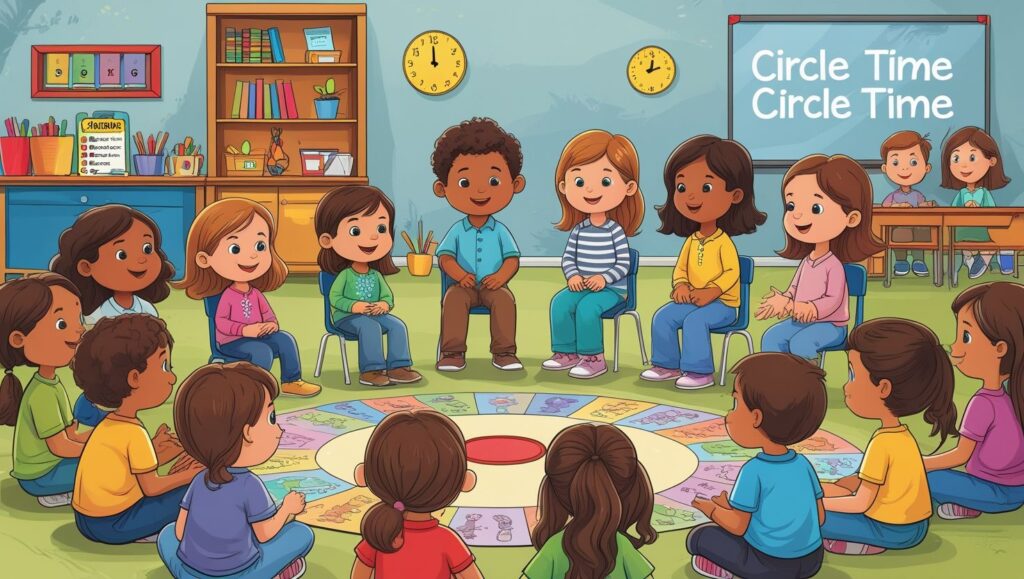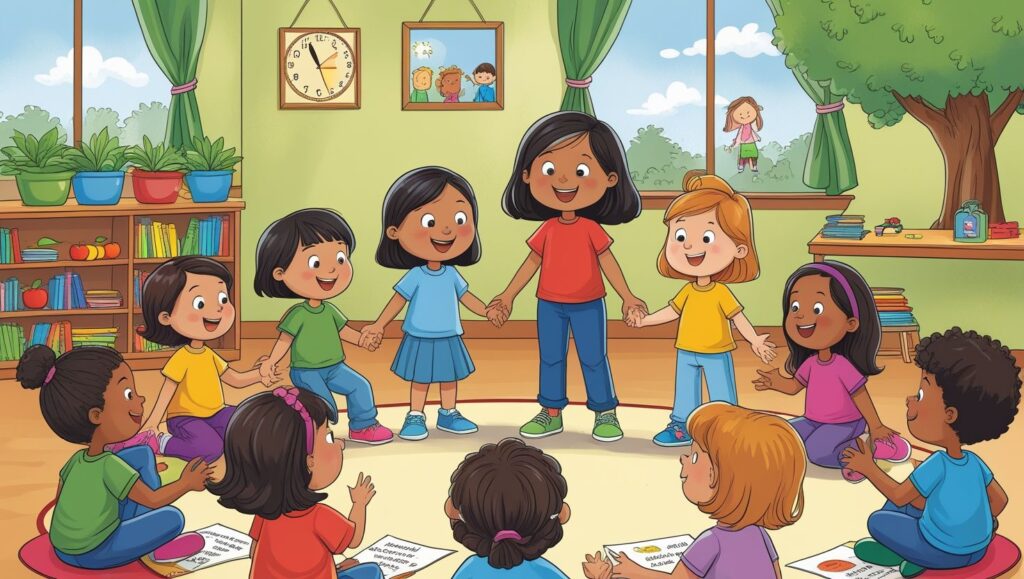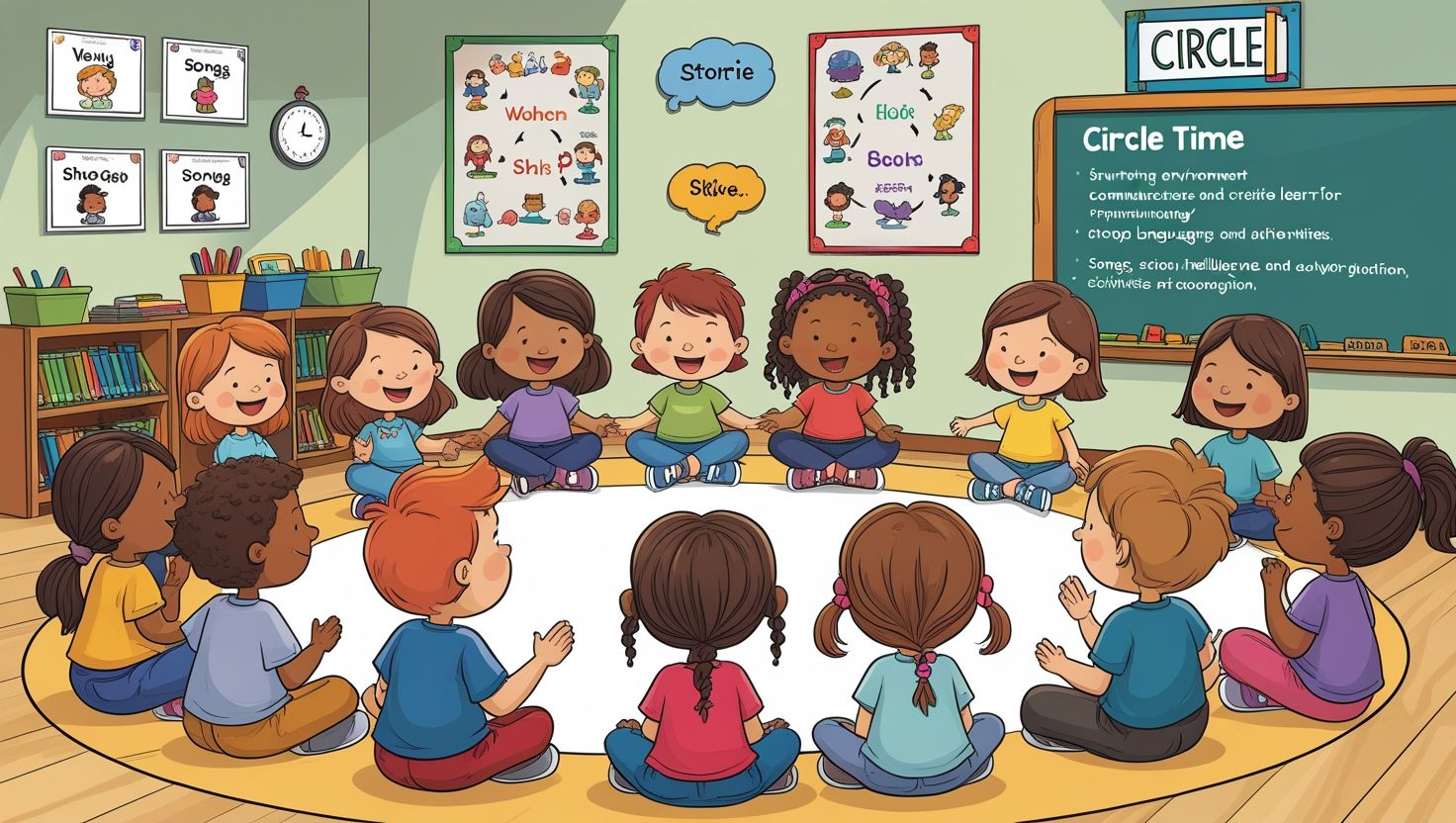Introduction
Early childhood is widely recognized as a critical period of growth and development, laying the foundation for lifelong learning, behavior, and overall well-being. During this stage, children develop rapidly across multiple domains—social, emotional, cognitive, and physical. Educators and caregivers seek effective methods to foster these areas in a holistic manner, and one such practice is Circle Time. Widely used in early childhood education programs around the world, Circle Time provides structured opportunities for young learners to come together, share experiences, and engage in activities that promote both individual growth and group cohesion. Far beyond being a routine classroom activity, Circle Time has a transformative role in shaping children’s early experiences, strengthening essential life skills, and preparing them for future learning and social integration.
Creating a Nurturing Environment
At its core, Circle Time provides a safe and inclusive setting where children gather with their peers and educators in a circle. The arrangement itself symbolizes equality and unity, as everyone can see and interact with each other directly. This structure fosters a strong sense of belonging and community within the classroom. Activities during Circle Time often include greetings, sharing personal experiences, group discussions, and cooperative games. Such routines help children feel valued and connected, while also encouraging them to express themselves freely in a supportive environment. Additionally, Circle Time provides a daily anchor of stability and predictability, which is particularly important for young children as they build trust and security in their learning environment. By nurturing respect, participation, and active listening, Circle Time helps cultivate essential social skills that extend beyond the classroom.

F.acilitating Social Development
One of the most significant contributions of Circle Time lies in its ability to foster social growth. Through interactive group activities—such as singing songs, reciting rhymes, or engaging in role-play—children learn important social behaviors like taking turns, sharing, cooperating, and following group norms. These experiences are essential for developing empathy, patience, and tolerance, qualities that prepare children to form positive relationships both inside and outside the school setting. For instance, when a child waits patiently for their turn in a game or listens to a classmate share a story, they are practicing self-regulation and learning to respect the perspectives of others. Over time, these repeated interactions lay the foundation for teamwork, collaboration, and effective communication—skills that will support children throughout their education and social lives.
Nurturing Emotional Intelligence
Circle Time also provides a structured yet flexible space for children to explore and understand their emotions. Activities like storytelling, role-playing, guided discussions, and mindfulness exercises allow children to express their feelings in healthy ways. For example, a teacher may use puppets or picture cards to help children identify emotions such as happiness, sadness, anger, or fear. These activities not only help children recognize their own emotional states but also encourage them to empathize with others by understanding that peers may experience different feelings. Developing emotional intelligence in early childhood is vital, as it fosters resilience, self-regulation, and a positive sense of self-worth. Children who can identify and manage emotions effectively are better prepared to handle conflicts, navigate relationships, and build coping strategies for challenges later in life. Circle Time, therefore, becomes a nurturing ground for cultivating strong emotional foundations.
Enhancing Language and Literacy Skills
Language development is a cornerstone of early learning, and Circle Time offers rich opportunities for children to expand their vocabulary and communication skills. During storytelling, group discussions, and rhymes, children are exposed to new words, sentence structures, and patterns of speech. Listening to stories not only develops comprehension but also introduces children to concepts of sequencing, narrative, and imagination. Singing songs and reciting rhymes enhance phonological awareness, which is a critical skill for early literacy. Additionally, Circle Time helps children practice active listening and turn-taking in conversations, strengthening both expressive and receptive language abilities. Educators often use visual aids, props, and storybooks to make activities more engaging, ensuring children develop an early appreciation for books and reading. These early literacy experiences prepare children for academic success by building a solid foundation in communication and literacy skills.
Stimulating Cognitive Development
Beyond social and language skills, Circle Time also promotes cognitive growth through playful yet intellectually stimulating activities. Teachers may introduce counting songs, sorting games, or discussions about nature, weather, and the environment to encourage curiosity and problem-solving. For example, when children count objects together or identify shapes and colors during a game, they are building numeracy and classification skills. Storytelling and questioning during Circle Time also enhance critical thinking and imagination, as children learn to predict outcomes, connect ideas, and ask questions. These experiences create a culture of inquiry where children are encouraged to explore, experiment, and think creatively. Such early stimulation of cognitive processes lays the groundwork for future academic achievement and nurtures a lifelong love for learning.

Promoting Physical Well-being
Physical development is another vital aspect supported by Circle Time. Many Circle Time activities incorporate movement, rhythm, and sensory play. Singing action songs, clapping games, simple yoga poses, or dance routines encourage children to move their bodies while also improving coordination, balance, and spatial awareness. These activities are not only enjoyable but also promote motor skill development. Furthermore, sensory-based activities—such as touching textured objects, mimicking animal movements, or exploring sounds—help integrate sensory processing and strengthen neural connections. Encouraging physical activity during Circle Time also instills healthy habits, reinforcing the importance of movement and exercise in daily life. Ultimately, by integrating fun and movement, Circle Time contributes to both physical health and overall well-being.
Holistic Growth and Continuous Assessment
The true strength of Circle Time lies in its holistic nature. By integrating activities that address social, emotional, cognitive, language, and physical domains, it nurtures the whole child rather than focusing on isolated skills. This balanced approach ensures that children grow as confident, well-rounded individuals. Moreover, Circle Time gives educators an invaluable opportunity to observe children in action. Teachers can assess social interactions, monitor emotional responses, evaluate communication skills, and identify individual strengths or areas needing support. These observations guide teachers in adapting their instructional strategies and providing personalized support where necessary. In this way, Circle Time serves as both a developmental tool and an informal assessment framework, helping educators track progress and ensure each child is on a positive developmental trajectory.
Conclusion
In conclusion, Circle Time is far more than a daily classroom routine—it is a transformative practice that enriches early childhood experiences and lays a strong foundation for lifelong success. By creating a nurturing environment, fostering social skills, cultivating emotional intelligence, enhancing language and literacy, stimulating cognitive growth, and promoting physical well-being, Circle Time supports the holistic development of children. It also provides educators with critical insights into children’s progress, allowing for responsive teaching and personalized guidance. As such, Circle Time stands as a vital component of Early Childhood Development (ECD) programs worldwide, preparing young learners not only for academic success but also for meaningful participation in society. By embracing Circle Time, educators and caregivers can help ensure that children experience joy, connection, and growth during the most formative years of their lives.

1hq08f
krvfsr
79t71a
Hi! This is my first visit to your blog! We are a team of volunteers and starting a new project in a community in the same niche. Your blog provided us valuable information to work on. You have done a outstanding job!
05m95b
I think this is one of the most vital information for me. And i am glad reading your article. But want to remark on few general things, The website style is great, the articles is really great : D. Good job, cheers
Well I truly liked studying it. This post offered by you is very helpful for proper planning.
I conceive this web site has some really fantastic info for everyone : D.
Fantastic website. A lot of useful information here. I?¦m sending it to several pals ans also sharing in delicious. And certainly, thanks for your sweat!
Hi my friend! I want to say that this post is awesome, nice written and come with almost all important infos. I’d like to peer extra posts like this .
Süleymaniye Mosque tour Our English-speaking guide explained everything clearly. https://gyldigitalsolution.com/?p=14680
Very interesting subject, regards for putting up.
Hagia Sophia tour Guides made the experience lively and enjoyable. https://ticketiando.com/?p=8943
Great post. I was checking continuously this blog and I’m impressed! Extremely helpful info specially the last part 🙂 I care for such info a lot. I was seeking this certain info for a long time. Thank you and best of luck.
I have read several good stuff here. Definitely worth bookmarking for revisiting. I wonder how much effort you put to create such a fantastic informative site.
Hi there, just became alert to your blog through Google, and found that it’s truly informative. I’m gonna watch out for brussels. I’ll appreciate if you continue this in future. Lots of people will be benefited from your writing. Cheers!
I’ve been absent for some time, but now I remember why I used to love this website. Thank you, I?¦ll try and check back more often. How frequently you update your web site?
Hello there, just became aware of your blog through Google, and found that it is truly informative. I’m gonna watch out for brussels. I’ll be grateful if you continue this in future. A lot of people will be benefited from your writing. Cheers!
I haven?¦t checked in here for a while as I thought it was getting boring, but the last several posts are great quality so I guess I?¦ll add you back to my everyday bloglist. You deserve it my friend 🙂
Sweet website , super design, rattling clean and use genial.
As a Newbie, I am constantly searching online for articles that can help me. Thank you